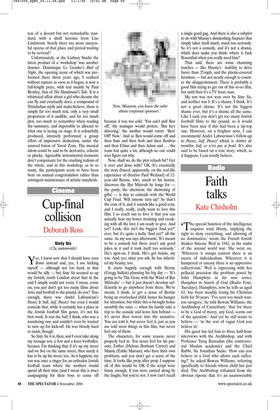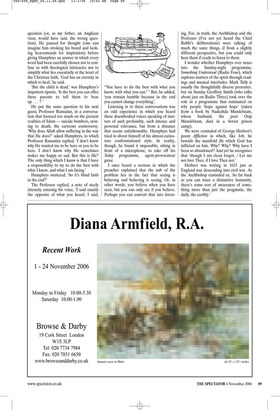Faith talks
Kate Chisholm
‘The special function of the intelligence requires total liberty, implying the right to deny everything, and allowing of no domination,’ wrote the French Jewish thinker Simone Weil in 1942, in the midst of the second world war. She went on, ‘Wherever it usurps control there is an excess of individualism. Wherever it is hampered or uneasy there is an oppressive collectivism.’ Weil is expressing with her pellucid precision the problem posed by John Humphrys in his new series, Humphrys in Search of God (Radio Four, Tuesdays). Humphrys, now he tells us aged 63, has been steadily losing his Christian faith for 50 years. ‘I’ve seen too much wanton savagery,’ he told Rowan Williams, the Archbishop of Canterbury, ‘that for there to be a God of mercy, any God, seems out of the question.’ And yet he still wants to believe — ‘in the sort of vague God you believe in’.
His quest has led him to three half-hour interviews with the Archbishop, and with Professor Tariq Ramadan (the controversial Muslim academic) and the Chief Rabbi, Sir Jonathan Sacks. ‘How can you believe in a God who allows such suffering?’ he asked Rowan Williams, referring specifically to friends whose child has just died. The Archbishop refrained from the obvious riposte that it’s an unanswerable question (or, as my father, an Anglican vicar, would have said, the wrong question). He paused for thought (one can imagine him stroking his beard and looking heavenwards for inspiration) before giving Humphrys an answer in which every word had been carefully chosen not to confuse us with theological intricacies nor to simplify what lies essentially at the heart of the Christian faith. ‘God has an eternity in which to heal,’ he said.
‘But the child is dead,’ was Humphrys’s impatient riposte. ‘Is the best you can offer these parents to tell them to bear up ... ? ’ He put the same question to his next guest, Professor Ramadan, in a conversation that focused too much on the present realities of Islam — suicide bombers, stoning to death, the cartoons controversy. ‘Why does Allah allow suffering in the way that He does?’ asked Humphrys, to which Professor Ramadan replied, ‘I don’t know why He wanted me to be here or you to be here. I don’t know why He sometimes makes me happy or sad. But this is life? The only thing which I know is that I have a responsibility to try to do the best with what I know, and what I am facing.’ Humphrys stuttered, ‘So it’s blind faith in the end?’ The Professor replied, a note of steely intensity entering his voice, ‘I said exactly the opposite of what you heard. I said, “You have to do the best with what you know, with what you can.” ’ But, he added, ‘you remain humble because in the end you cannot change everything’.
Listening in to these conversations was an odd experience in which you heard these disembodied voices speaking of matters of such profundity, such intense and personal relevance, but from a distance that seems unfathomable. Humphrys had tried to divest himself of his almost-caricature confrontational style. In reality, though, he found it impossible, sitting in front of a microphone, to take off his Today programme, agent-provocateur guise.
I once heard a sermon in which the preacher explained that the nub of the problem lies in the fact that seeing is believing and believing is seeing. Or, in other words, you believe when you have seen, but you can only see if you believe. Perhaps you can convert that into listen ing. For, in truth, the Archbishop and the Professor (I’ve not yet heard the Chief Rabbi’s deliberations) were talking of much the same things, if from a slightly different perspective, but you could only hear them if ready to listen to them.
I wonder whether Humphrys ever tunes into the Sunday-night programme, Something Understood (Radio Four), which explores matters of the spirit through readings and musical interludes. Mark Tully is usually the thoughtfully diverse presenter, but on Sunday Geoffrey Smith (who talks about jazz on Radio Three) took over the role in a programme that ruminated on why people ‘hope against hope’ (taken from a book by Nadezhda Mandelstam, whose husband, the poet Osip Mandelstam, died in a Soviet prison camp).
We were reminded of George Herbert’s poem Affliction in which, like Job, he bewails the manifold ills which God has inflicted on him. Why? Why? Why have I been so abandoned? And yet he recognises that ‘though I am clean forgot, / Let me not love Thee, if I love Thee not.’ Herbert was writing in 1633 just as England was descending into civil war. As the Archbishop reminded us, ‘As far back as you can trace a distinctive humanity, there’s some sort of awareness of something more than just the pragmatic, the daily, the earthly.’



















































































































 Previous page
Previous page